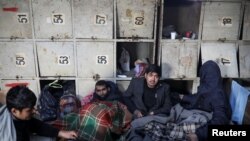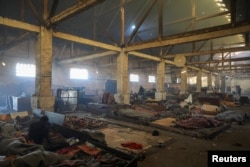Rising numbers of migrants from the Middle East and Central Asia are ending up homeless in sub-zero temperatures in Serbia with more arriving from Bulgaria as countries further along the so-called Balkan corridor to western Europe tighten their borders.
Serbian authorities and international agencies are unable to house all the newcomers, with about a fifth of the almost 7,000 sleeping on the streets in Belgrade’s city center or at the border with Hungary, according to the U.N. refugee agency (UNHCR).
"We are concerned that the migrant crisis has not abated and there are things we cannot influence," Serbia's minister for labor, employment, veterans and social policy, Aleksandar Vulin, said over the weekend.
In Belgrade, where temperatures are dropping as low as minus 6 degrees Celsius (21 degrees Fahrenheit) at night and barely rising above freezing by day, around a thousand people are living in derelict warehouses near Belgrade train station.
Many are without blankets and they burn railway sleepers inside the bare concrete building for warmth. Meals distributed by charities are not sufficient for all the inhabitants.
"It's all like living in hell — smoke everywhere, cold, people are coming every night from Bulgaria," said a young man from Afghanistan who gave his name as Jamshaid.
Dozens of migrants, mainly from Afghanistan, were taken to the hospital in Croatia on Sunday after police stopped a van carrying 67 people and arrested two Bulgarian citizens suspected of human trafficking.
"It's not easy to cross the border with smugglers now. We know they're cutting the fence into Hungary," Jamshaid said. "We will go on our own, we won't have a smuggler with us."
Fellow migrant Podari, from Pakistan, said some had tried to cross the border into Croatia but had been caught and beaten.
The Balkan route used by hundreds of thousands of migrants fleeing conflict to reach western Europe has been made far more difficult in the past year, with countries tightening border controls or erecting fences. But loopholes remain, including a fairly porous boundary between Serbia and Bulgaria.






